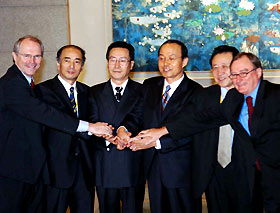Financial Times Deutschland,
Germany
U.S. Impatience 'Provoked' North Korean Nuclear Test
The U.S. imposed sanctions on North Korea too soon, and in the process provoked Pyongyang's first nuclear test. Now it's depending on China and South Korea to find a way out of the mess.
By Sabine Muscat 
Translated by Bob Skinner
October 9, 2006
Germany - Financial Times Deutschland - Original
Article (German) 
 Agreement is reached in Six-Party Talks,
Agreement is reached in Six-Party Talks,
September 19, 2005. The elation lasted all
of 24 hours. (above).
North Korean propaganda posted that reads,
'With the people's united power, let's crush U.S.
maneuvers to provoke a nuclear war.' (below)
 ---------------------------------------------------------
---------------------------------------------------------
U.S. President
George Bush has said a number of times, "We will never tolerate a nuclear-armed
North Korea." But now he has been forced for the first time to define what
that sentence actually means. In the days before North Korea's nuclear test on
Sunday, the White House, according to U.S. media reports, had already drawn up
a list of possible sanctions - beyond those already in effect. An
administration official was quoted as saying the "entire palette" would
be employed, though he admitted that no one knew exactly what this "palette"
might include.
But the U.S.
had exhausted its palette even before it was clear that North
Korea has conducted a nuclear test. North Korea's capacity to launder money
overseas or smuggle counterfeit notes had already been drastically limited. And
ships with suspicious cargo had already been intercepted to prevent the
proliferation of weapons. New sanctions that the Security Council could now arrange
- and it can scarcely avoid it - must be created by someone other than the U.S.:
China or South Korea.
China and
South Korea have the difficult task of withdrawing a helping hand from a neighbor;
while at the same time they must avoid burning all of their bridges. The sanctions which
they might impose - withdrawing fuel and food - will be primarily absorbed by
the North Korean population. Kim Jong-il
is battling for the survival of his regime, and everything we know about him
says that he would sooner put all of his people to the knife than accept defeat.
 Ambassador Christopher Hill:
Ambassador Christopher Hill:
America's point man in Asia
has a new crisis on his hands.
--------------------------------
The
governments in Beijing and Seoul - not to mention the newly-nominated U.N. Secretary
General, South Korean Foreign Minister Ban Ki-moon - must now plumb the depths
of their knowledge and experience in regard to North Korea, to assess what Kim
Jong-il's price might be to abandon his nuclear program. The U.S. unfortunately
lacked such insight, when in September 2005 it concluded an outline agreement
with North Korea and then impatiently and almost immediately imposed sanctions.
North Korea then broke off negotiations, in order to enter the next round of
talks as a nuclear power.
[Editor's
Note: The September 19, 2005 agreement that was reached at Six-Party Talks in
Beijing broke down shortly thereafter, over an apparent disagreement as to the
timing of actions to be taken by the parties. North Korea insisted that, "the United States should not even dream" that it would give up
its nuclear weapons and programs until after having received - not one,
but two - light-water nuclear reactors. The U.S. position is that Pyongyang had
agreed to credibly give up its nukes before obtaining a single light
water reactor].
German Version Below
Quittung für die Ungeduld
von Sabine Muscat
Die USA hatten ihre Sanktionen gegen Nordkorea zu früh verhängt und damit einen Atomtest erst recht herausgefordert. Nun bleibt es an China und Südkorea hängen, einen Ausweg aus dem Schlamassel zu finden
"Wir werden ein nuklear bewaffnetes Nordkorea nicht tolerieren" - diesen Satz hat US-Präsident George W.
Bush schon mehrmals gesagt. Doch nun ist er erstmals gezwungen zu definieren, was das heißen könnte.
In den Tagen vor dem nordkoreanischen Atomtest am Sonntag hatte das Weiße Haus nach US-Medienberichten bereits eine Liste mit möglichen Sanktionen erstellt - über die bereits bestehenden hinaus. Die "ganze Palette" wolle man anwenden, ließ sich ein Regierungsbeamter zitieren. Doch gab er danach zu, dass niemand so genau wisse, was die ganze Palette sein könnte.
Es rächt sich jetzt, dass die USA ihre Palette bereits ausgeschöpft haben, als zumindest noch offen war, ob Nordkorea sich von einem Test würde abhalten lassen. Nordkoreas Möglichkeiten, im Ausland Geld zu waschen oder Falschgeld zu schmuggeln, wurden bereits drastisch eingeschränkt. Auch Schiffe mit verdächtiger Ladung werden bereits abgefangen, um die
Proliferation von Waffen zu verhindern. Neue Sanktionen, die der Sicherheitsrat jetzt beschließen kann - und er wird darum kaum herumkommen - müssten von anderen umgesetzt werden als von den USA: von China und von Südkorea.
China und
Korea stehen vor der schwierigen Aufgabe, dem Nachbarn die helfende Hand wegzuziehen, ohne alle Brücken nach Pjöngjang abzubrechen. Die Sanktionen,
die sie verhängen könnten - der Entzug von Energie- und Nahrungsmittelhilfen - werden als erstes die Bevölkerung treffen. Kim Jong-il kämpft ums Überleben seines Regimes, doch nach allem, was man von ihm weiß, dürfte er bereit sein, im Angesicht der drohenden Niederlage sein ganzes Volk ans Messer zu liefern.
Die Regierungen in Peking und Seoul, aber auch der designierte südkoreanische Uno-Generalsekretär Ban Ki-moon sind jetzt gefordert, ihre Einblicke in die Funktionsweise des nordkoreanischen Systems zu nutzen und auszuloten, unter welchen Bedingungen sich Kim Jong-il sein Atomprogramm womöglich tatsächlich abkaufen ließe. Die USA hatten diesen Beweis leider nicht abgewartet, als sie im September 2005 erst ein Rahmenabkommen mit Nordkorea schlossen und dann ungeduldig fast zeitgleich ihre Sanktionen verhängten. Nordkorea brach die Gespräche ab - um in die nächste Runde als Atommacht zu gehen.